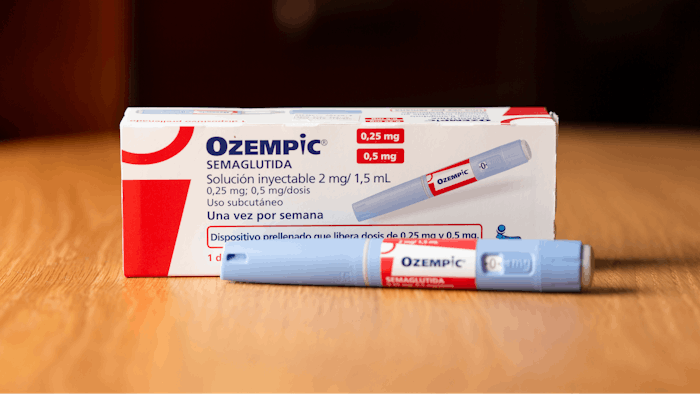
Ethical dilemmas are beginning to surround Ozempic and its manufacturer Novo Nordisk, yet the drug is only gaining in popularity. The diabetes drug became known throughout medical aesthetics and the weight loss industry for its off-label weight loss potential. Once it hit the mainstream, Ozempic (and other semaglutide drugs) accelerated into new possibilities, with clinical trials exploring its potential use for additional health ailments, celebrities and influencers sharing their Ozempic journey and the fitness industry beginning to embrace its weight loss support. There has also been pushback on the use of Ozempic, with concerns about its risks, long-term effects and ethical nature for patients and the medical aesthetics industry.
Related: Genetic Test Predicts Patient Response to Semaglutide for Weight Loss
Popularity
Semaglutide, the main active ingredient in Ozempic, is a glucagon-like peptide 1(GLP-1) that decreases appetite and increases satiety, leading to decreased caloric intake. It also causes decreased gastric emptying, leading to the sensation of being fuller longer after meals, which typically decreases calorie intake.
The FDA has approved Wegovy for obesity and the medication can be helpful for obese patients, especially if they have weight-related medical problems. Ozempic has FDA approval for improving blood sugar control in adults with type 2 diabetes in combination with diet and exercise. However, the FDA claims these medications should not be the only method patients use to lose fat.
Ozempic is the most searched weight loss drug, outpacing Wegovy, its closest competitor, by 300%. The total prescriptions for Ozempic in 2022 reached 2.2M, marking a staggering 857% growth since 2019. Approximately one-quarter of all Ozempic prescriptions were issued for individuals not diagnosed with diabetes even though the drug is not yet officially approved for weight loss.
New Pushback Against Novo Nordisk
The Federal Trade Commission (FTC) has sent warning letters to 10 companies and notified the FDA that it disputes the accuracy or relevance of more than 300 Orange Book patent listings across 20 different brand name products. Notably, Ozempic manufacturer Novo Nordisk received a letter from the FTC challenging 17 patents related to Ozempic, Saxenda and Victoza.
The FTC argued that the alleged patents are “junk” listings that could be used by pharma companies to stymie competition and inflate drug prices.
The patent listings are currently listed in the FDA’s publication of “Approved Drug Products with Therapeutic Equivalence Evaluations,” commonly known as the Orange Book, which lists drug products approved by the FDA as safe and effective.
After an initial round of challenges launched in November against more than 100 patents by nine drugmakers, the FTC targeted another 300-plus patent listings in May by eight pharma firms in the FDA’s Orange Book.
Rising Prices for Ozempic
Novo Nordisk has also caught the attention of the U.S. Senate, specifically Sen. Bernie Sanders (I-Vt.), chair of the Committee on Health, Education, Labor and Pensions (HELP), for alleged "astronomically" high prices for Ozempic and catalyzing a massive spike in drug spending.
Sanders informed Novo Nordisk CEO Lars Fruergaard Jorgensen in a written letter that charging Americans up to $1,349 a month for a drug costing less than $5 to manufacture cannot continue and his congressional examination is underway. Sanders also alleged the company was claiming two different prices for the same drug under different branding.
"Semaglutide for diabetes is marketed as Ozempic, while semaglutide for weight management is marketed as Wegovy,” wrote Sanders. “Novo Nordisk charges Americans with obesity nearly $400 more every month than those with type 2 diabetes for the same product provided in similar doses.”
Pew Research Center reports that Ozempic, Rybelsus and Wegovy made up nearly two-thirds of Novo Nordisk’s revenue in 2023. The drugs’ combined sales were 89% higher than in 2022. Last year, 71% of semaglutide revenues came from the United States.
In September 2023, Novo Nordisk shares achieved a record peak, trading at $199.05 with a market capitalization of $335 billion. This represents a 340% appreciation since the introduction of Ozempic in December 2017.
Top 5 prescription drugs by spending in 2023 (2023 Expenditures), per AARP
- Semaglutide (Ozempic, Rybelsus, Wegovy) $38.58 billion
- Adalimumab (Humira) $35.33 billion
- Apixaban (Eliquis) $22.11 billion
- Dulaglutide (Trulicity) $16.28 billion
- Empagliflozin (Jardiance) $15.89 billion
Ozempic's Medical Advancements
Semaglutide's use is potentially expanding beyond just diabetes and weight loss. Clinical trials are underway testing GLP-1 drugs to treat Alzheimer's, Parkinson's and even drug addiction, according to Lexaria, which offers a GLP-1 drug that uses a DehydraTECH drug-delivery formulation and processing technology to improve both delivery and efficacy. The company's study on the drug suggested potential indications of therapeutic efficacy in heart disease and chronic kidney disease, as well as a wide range of other conditions.
"Given these advancements, it is likely that these medications will not only continue to expand their reach but also become a standard in preventive medicine in the United States," said Johnny Franco, M.D., board-certified plastic surgeon and owner of Austin Plastic Surgeon. "The growing body of evidence supporting their efficacy suggests a broader application beyond weight loss, paving the way for a significant role in overall health management."
Ozempic Face
While GLP-1 drugs are touted for their efficacy and generally compelling safety profile, they still can trigger nausea, vomiting, diarrhea and other typical side effects. Rapid weight loss induced by Ozempic can lead to dermatological changes, including increased signs of aging such as lines and wrinkles. Loose skin is a typical side effect of weight loss procedures, but with the popularity of Ozempic, its potential risks on facial skin has been significant enough that the effect is now referred to as "Ozempic face."
Ongoing research is examining the long-term effects of Ozempic on bone density and muscle loss. Knockoff Ozempic, which surfaced during supply shortages as a result of a spike in popularity, offers more risks.
"Skin-related issues are commonly observed in patients using medications like semaglutide or GLP medications," Dr. Franco said. "The primary concern is the noticeable facial changes attributed to rapid weight loss. This can result in skin laxity and facial hollowness. Fortunately, noninvasive treatments have proven effective in addressing these issues."
Direct-to-Consumer Semaglutide
Eli Lilly's new direct-to-consumer (DTC) service, LillyDirect, will allow patients to order 14 medications for home delivery, 12 of which are various types of insulin, all capped at $35 per month. The program also includes the weight loss drug Zepbound (tirzepatide) and one migraine medication, Emgality (galcenezumab).
Patients can access these obesity medicines through the telehealth platform FORM, reaching independent telehealth providers who can complement a patient's current doctor or be an alternative to in-patient care in some cases, according to Lilly.
The United States and New Zealand are the only countries that allow DTC advertising for prescription drugs.
As medical experts have pointed out, DTC arrangements complicate the ethics of prescriptions and patient follow-ups. Providers often face a conflict of interest when prescribing dangerous drugs to patients who request them. By attaining quick results from Ozempic injections, MD Edge predicted that consumers will not learn the proper habits to keep the weight off and will continuously come back to buy the drug instead.
This sentiment is echoed by Tracie Haines-Landram, CSCS*D, a certified strength and conditioning specialist with distinction from the National Strength and Conditioning Association, who believes normalization and advertisement of weight loss medications in gyms will affect the established perspective that exercise is the primary driver of weight management. This comes in response to Life Time Fitness' plans for a program to prescribe weight loss injections for members through in-house medical teams, including Ozempic, according to Life Time president and COO Jeff Zwiefel. The company would be the first gym to join the semaglutide trend.
CareValidate launched the CareGLP teletherapy program to provide businesses with "unprecedented access to GLP-1 therapies, including semaglutide." CareGLP equips brands with a comprehensive SOC2, GDPR, HIPAA and CCPA-certified platform that seamlessly integrates every aspect of obesity care, from initial diagnosis to ongoing support and medical treatment. It integrates CareValidate's case management platform with a network of trusted suppliers and providers, making it easy and efficient to offer GLP-1 medications to the user base.
Considering its extensive reach and presence, remaining aware of how rising Ozempic use is impacting aesthetic treatments is vital to providing optimal care to patients amidst this rapidly growing weight loss trend.
More: Top 10 States with Highest Demand for Ozempic











